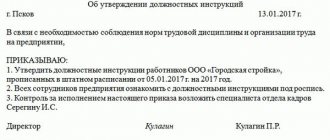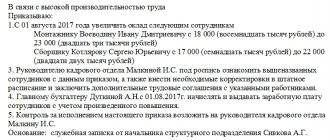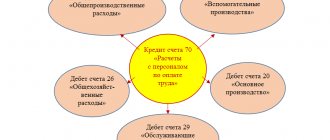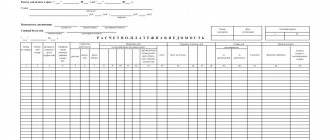All about the position of accountant
An accounting employee is required to perform functions related to the payment of wages to employees of the enterprise. They are:
- Reception and processing of documents on the basis of which accruals and deductions for wages are made. Sick leave, orders from the manager on bonuses for employees, vacation applications, writs of execution - this is the documentation with which the accountant works;
- Calculation of wages for company employees. Based on the working time sheet, the specialist calculates earnings and accrues funds. In addition, the accountant withholds taxes and fees in accordance with current legislation;
- Making report. The employee prepares a report on the activities of the enterprise and sends it to the tax authorities, the Pension Fund of Russia, and the Social Insurance Fund;
- Accounting and storage of papers, certificates, constituent documents;
- Communicating with regulatory authorities during inspections, providing information on employee salaries to government agencies.
The job descriptions of a bookkeeper are not limited to this list. The specialist is obliged to closely monitor changes in the labor legislation of the Russian Federation and be aware of innovations in the Tax Code. Additionally, the accountant provides employees with the necessary certificates to apply to banks, medical institutions, and insurance companies.
In many organizations, an accountant combines his position with personnel work. In this case, the list of responsibilities includes maintaining personal files of employees, storing and filling out work books, forming seniority, applying for a job, and dismissal.
A professional accountant must have certain skills, knowledge and experience to carry out the activity correctly.
Sample job description for payroll accountant
Common parameters
- A payroll accountant is hired and fired by the head of the company on the recommendation of the chief accountant.
- The payroll accountant reports to the company's chief accountant.
- A payroll accountant must meet the following qualification requirements:
- higher (secondary specialized) education in accounting;
- Three years of work experience in accounting.
- During the absence of a specialist (advanced training, treatment of illness, etc.), he is replaced by another employee of the company’s accounting department, appointed as the chief accountant.
- A payroll accountant must understand:
- legislation and regulations governing accounting activities in commercial organizations;
- current standards and rules of regulatory authorities (Federal Tax Service, Social Insurance Fund, Pension Fund, etc.) regulating the process of accounting in the field of wages;
- accounting policies used in the company;
- rules for checking primary accounting documentation;
- rules for working with documents on temporary disability of employees;
- principles for calculating the base and variable parts of salaries;
- rules for calculating and calculating taxes and fees from the salaries of company employees;
- principles of interaction with representatives of the Federal Tax Service, Pension Fund and other structures when they conduct accounting audits;
- standards for correct reflection in reporting items of transactions related to payments to company employees;
- the structure of the company and areas of its business activity;
- personnel composition of the company;
- principles of office management that are mandatory for use in the company;
- principles of working time recording and KPI indicators used in calculating employee salaries;
- standards of labor discipline, fire safety, etc., which are mandatory for compliance by company employees;
- rules for using office equipment, computers and specialized software products (Microsoft Office, 1C: Accounting).
- The payroll accountant is guided by: laws and regulations governing the field of accounting;
- company profile documents;
- this instruction.
Functions
The payroll accountant is responsible for:
- Ensuring settlements with personnel regarding wages (salaries, taxes on them, additional payments, etc.).
- Correct reflection of transactions with personnel on reporting accounts.
- Providing managers, chief accountant and other persons with appropriate authority with information on transactions in their field of activity.
- Monitoring the timeliness and completeness of payments to personnel.
- Monitoring changes in the regulatory framework in your area of responsibility.
- Preparation of certificates, notes and other documents in the field of settlements with personnel for submission to the Federal Tax Service and other regulatory authorities.
- Verification of documents submitted by employees to calculate salaries, receive benefits and additional payments.
- Participation in the preparation of annual and quarterly financial statements of the company.
- Preparation of documents required for work in accordance with company rules.
- Participation in the development of the company's accounting policies and non-standard forms of documents in his area of responsibility.
- Ensuring storage and archiving of accounting documentation in your area of activity.
- Assisting the chief accountant and other accounting staff in their activities.
- Compliance with confidentiality standards, fire safety rules and other parameters specified in the relevant internal documentation.
- Informing the chief accountant on any problematic issues noted.
- Entering necessary records into the company's electronic database.
Responsibility
The payroll accountant is responsible for:
- Material damage suffered by the company due to his actions is in the amounts determined on the basis of the provisions of the current legislation.
- Failure to perform one's job functions - in accordance with the parameters defined in company rules and labor legislation.
- Violation of confidentiality standards - in accordance with company policies and applicable laws.
- Violations of norms and laws committed during the performance of work - within the boundaries defined in labor, administrative or criminal law.
Rights
The payroll accountant has the authority to:
- Receive from other employees the information necessary in their activities.
- Suggest measures to improve labor procedures to the chief accountant.
- Endorse documents within your responsibility.
- Participate in company staff meetings where accounting issues are discussed.
- Improve your qualifications at the expense of the company in accordance with the parameters set out in internal documentation.
- Request and receive from company management access to ATP, industry press and specialized online resources.
What knowledge is needed for the job?
An accounting specialist must have a higher education. Only deep theoretical knowledge allows you to carry out competent work. The accountant must understand the following issues:
- Labor and tax legislation of the country, regulations on remuneration of workers;
- The procedure for compiling, processing and storing primary documentation;
- Systematization of information on accruals and deductions for employees;
- Working with accounting software;
- Features of the specialization of the enterprise, the taxation system for legal entities and other nuances that affect the payment of salaries;
- Document flow at the enterprise, rules for storing reports and important documentation;
- Inventory, accounting of values belonging to the organization;
- Formulas for calculating wages and methods for checking the accuracy of accruals;
- Transfers and receipt of funds to the current account from contractors, suppliers, partners of the company;
- Labor protection, safety at work.
A professional accountant must be able to apply theoretical knowledge to work. This skill determines how well he copes with his position.
The qualifications of a payroll specialist can be improved through courses. The knowledge gained allows the employee to improve and simplify reporting and use modern technologies. Managers often engage accountants to plan the organization’s economic activities and draw up a budget.
Job responsibilities
The job responsibilities of a payroll accountant include a range of specific tasks. At the end of the month, you need to check your timesheet (a document that records working hours). This is necessary in order to make an assessment and prepare for the calculation.
The accountant receives and checks sick leave, deals with payroll, contributions to extra-budgetary funds, and personal income tax. He calculates vacation pay, benefits, and makes final payments upon dismissal of employees. This specialist also carries out reconciliations with regulatory authorities (PFR, Social Insurance Fund, Federal Tax Service), takes part in inspections, and provides the necessary information. He registers the relevant transactions and transactions and posts them to the required account in a specialized program.
In small organizations, the responsibilities of a payroll accountant include not only accrual, but also transfer of taxes and contributions, and payments to employees. In large organizations, payments are handled by separate specialists. Also, in small companies, the accountant may be assigned the duties of a personnel officer.
In addition, it is important to take part in improving the types and methods of accounting, while using modern equipment and information technology, using new sources and knowledge acquired in advanced training courses. It should also assist in conducting an economic analysis of the enterprise's activities, relying on accounting records in order to identify the company's existing reserves and improve document flow in general. All of the above covers the responsibilities of a payroll accountant. There should always be order in the company's budget. It is necessary to additionally monitor the safety of accounting documents and prepare them in the appropriate order for the archive. After which you need to properly deposit them in accordance with the requirements. It is also necessary to promote the introduction of advanced computer technology, maintain and store accounting databases, and make amendments to them regarding reference and regulatory information.
Requirements for a candidate for the position
Advertisements for a payroll employee can often be seen on various employment websites. When posting a vacancy, enterprises put forward certain requirements for an accountant. They are as follows:
- An applicant for a position must have a diploma of higher or secondary specialized education in the field;
- The applicant's qualifications must be confirmed by a certain rank according to the professional standard;
- The candidate must not only be able to calculate wages, but also understand other accounting issues;
- A professional must be familiar with the basic computer programs for accountants, be able to work with them, and confidently use office equipment.
The applicant must list in his resume all the professional skills he possesses. The more detail an accountant tells about his career and education, the greater his chances of finding a job.
The salary of an accountant depends on his knowledge and work experience. As a rule, an employee is registered as a trainee or assistant to the chief specialist. After completing the probationary period, he is assigned a salary based on his qualifications.
Rights
A payroll accountant has certain rights. He may demand from the company management appropriate conditions for the performance of his functions. It is important for an accountant to know about existing projects, decisions, and requirements that directly affect his activities. In addition, you can make suggestions for improving the work that is the responsibility of the payroll accountant. The specialist also has the right to request documents or information from the unit at the request of the company management. Among other things, such a specialist is obliged to improve and maintain his skills, take additional classes, and look for innovations on forums and websites. It is important to get acquainted with new regulatory documents or changes in them, to participate in all kinds of conferences, meetings, events that help improve the skills and knowledge of an accountant.
Rules for the work of an accountant
A job description is a document that guides the accountant in his work. It lists the main provisions of the position. The instructions are developed by a senior accountant or personnel officer, after which the candidate signs it when applying for a job.
The accountant's instructions contain:
- List of tasks to be performed;
- Work day routine;
- List of skills and knowledge that a specialist must have;
- Types of punishment for violation of labor discipline;
- Rights of an enterprise employee;
- Information about liability for violations.
The document is created in two copies. The job applicant reads the instructions, then signs and takes one copy for himself.
We should talk about the rights of an accountant in more detail. An employee has the right to receive information from management about changes in working conditions that directly affect his position. In addition, the accountant must be aware of the financial activities of the enterprise and personnel changes.
A specialist has the right to decent working conditions to perform his work efficiently. The accountant's workplace must be equipped with everything necessary. Lunch time and work schedule are specified in the employment contract.
The head of the organization must provide the employee with access to documents, as well as issue a power of attorney in the name of the accountant, which would allow him to make requests to government agencies. The standard job description has a section on advanced training. An employee has the right to improve his knowledge, receive additional education in his specialty, and participate in various events dedicated to the work of an accountant.
Basic provisions of the position of accountant
For a payroll accountant, functional responsibilities must be recorded in the job description, which is one of the main documents when applying for a job. It is developed by personnel department employees or the chief accountant, and approved by the management of the enterprise.
The job description contains a certain list of points, including:
- general provisions for the position of accountant;
- knowledge that an employee must have;
- functional responsibilities that he will perform;
- employee rights when performing work;
- responsibility for all actions taken.
An accountant must be familiar with the job description under his personal signature before being hired. The document is drawn up in two copies: one remains in the personnel department of the enterprise, the second is transferred to the employee.
Similar articles
- Accountant materialist job responsibilities
- Responsibilities of a cashier accountant
- Assistant chief accountant responsibilities
- Lead accountant at ETKS
- Job responsibilities of an HOA accountant
Responsibility
As already mentioned, an accountant is a responsible person.
He works with a large number of important documents, monitors legislation updates, and has access to funds. Accordingly, he is responsible for his work and the values of the enterprise.
In case of improper performance of duties, the following types of liability apply to the specialist:
- Disciplinary – in case of violation of the terms of the contract or daily routine. Punishment is applied in the form of a reprimand, reprimand or dismissal from work;
- Material – for the actions of the employee, due to which the company suffered losses. In this case, the person must compensate for the damage in full or in part;
- Administrative - for offenses provided for by the Code of Administrative Offenses of the Russian Federation;
- Criminal - crimes related to the provision of false information to regulatory authorities, non-payment of taxes, concealment of enterprise profits, theft of funds. For such actions a person can be convicted.
In addition, the accountant is obliged to keep the organization’s trade secrets and maintain order in the workplace.
The rights of an accountant reflected in the job description
The instructions also recommend reflecting the payroll accountant’s rights to:
- assistance in the implementation of labor functions from the head of the employing company and other managers;
- making personal decisions within the limits of available authority;
- internal corporate information exchange and negotiations with employees of other divisions of the company in order to resolve current work issues;
- obtaining information about necessary internal corporate resources, including those that constitute a trade secret, if this is necessary to solve current problems;
- submitting proposals for optimization of their work and the enterprise as a whole to the management bodies of the company for discussion.
Note that in many enterprises, a payroll accountant can directly participate in the discussion of business development prospects at the senior management level. In this case, this possibility is usually recorded in the list of specialist rights reflected in the instructions in question.









